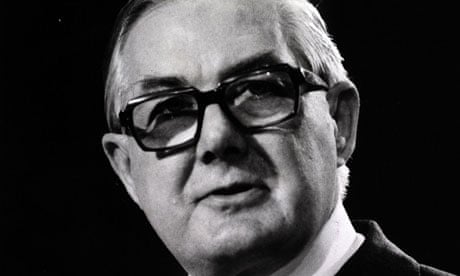Jim Callaghan, born 100 years ago this week, is our most underestimated prime minister. He has been stereotyped as the very model of Old Labour, the embodiment of the historic alliance with the unions. People still remember 1978, when he sang an old music-hall song to the TUC, There Was I Waiting at the Church (wrongly attributed to Marie Lloyd), to the TUC. Peter Mandelson saw Callaghan as embodying everything that New Labour rejected.
In fact, his was an astonishing career. He is the only person ever to have held all four top positions in government. His life was full of surprises, high drama and bold decisions, notably on the unions and Northern Ireland. He saw himself not as Old but as "original" Labour. As such, his achievements survive.
More than most politicians, he was moulded by his background. His early years were dominated by three factors – poverty, from the deprivation his family suffered in Portsmouth when his father died when Jim was only nine; puritanism, from the unpermissive morality of the Baptist church; and patriotism, from the naval glories of Portsmouth: his father served on the royal yacht under Edward VII. Crucially, he was our only trade unionist prime minister, rising up in the Inland Revenue's white-collar union. He always retained an instinctive devotion to union practices and the bargaining style. He deplored the way middle-class Labour leaders such as Hugh Gaitskell and Tony Blair failed to appreciate the unions' traditions.
He emerged as a young Labour MP after 1945, and matured as a politician at every stage of his career. As shadow colonial secretary after Suez, he built up personal alliances with Kenneth Kaunda, Julius Nyerere and other leaders of black Africa, and acquired a new internationalism of outlook. As chancellor of the exchequer under Harold Wilson, he endured the stress that led to the devaluation of the pound. Yet the subsequent flak was directed more towards Wilson's claim '"The pound in your pocket is not being devalued."
The pivotal period of Callaghan's career was at the Home Office from 1967 to 1970. His reputation soared with his calm handling of student protests, while his defence of the unions during the arguments on the white paper In Place of Strife reinforced his standing within the Labour movement. More constructively, his executive boldness in handling Northern Ireland marked him out as a big-league player, and he might have sorted out the problems of Ireland had he stayed in office.
He added to his reputation at the Foreign Office in 1974–6. He claimed to have renegotiated Britain's terms of membership of Europe's Common Market, saving Labour from a great split and helping to win the referendum on membership. More, he proved himself a successful bridge builder between the US and Europe – far more so than Blair – with his relationships with Henry Kissinger and the German chancellor, Helmut Schmidt.
He was particularly effective as prime minister. He was notably unpresidential. His style was collective, with cabinet government protected and a collegiate approach encouraging openness and trust. He was not a man for "sofa government" or for much spin. His press secretary, Tom McCaffrey, was a quiet professional who knew his place. Callaghan's own prestige grew after the settlement of the IMF crisis; he then struck out boldly in several policy areas, pushing Labour in directions later associated with New Labour. He questioned postwar economic orthodoxy and emphasised the centrality of inflation. He called for better teaching standards in the nation's schools. An old police adviser, he identified Labour anew with a commitment to law and order. More reluctantly, he introduced Welsh and Scottish devolution. Abroad, he became distinctly pro-European and helped Jimmy Carter to negotiate the Camp David agreement in Palestine.
In the end, his own unions and the Bennite left let him down in the winter of discontent. Yet his reputation had risen steadily while at No 10, a rare event. This old party man proved successful less in leading his unfraternal comrades than in guiding the nation. His three years as premier, sometimes wrongly seen as just an interlude between the regimes of Wilson and Thatcher, had a positive quality all their own. Denis Healey described Callaghan as our best prime minister since Attlee, one who believed there was such a thing as society.
Ed Miliband's Labour is very different. The unions are marginalised. The party is committed to new approaches on gender issues, constitutional reform and globalism. But what gave Callaghan real substance was something else, a rooted commitment to the values and narrative of British social democracy. Unlike most Blairites, he had a powerful sense of history, but his concept of community was less inward-looking than that of "Blue Labour". He is, along with Arthur Henderson and Herbert Morrison, one of the three key figures who turned Labour into a party of government. A hundred years on, Big Jim still stands tall.
